Knockabout (1979)
Directed by: Sammo Hung
Written by: Huang Chik-chin, Louis Lau
Starring: Bryan Leung, Lau Kar-wing, Sammo Hung, Yuen Biao
AKA ZA JIA XIAO ZI
HONG KONG
AVAILABLE ON BLU-RAY from EUREKA ENTERTAINMENT
RUNNING TIME: 104 mins [Hong Kong Version]/ 93 mins [Export Version]
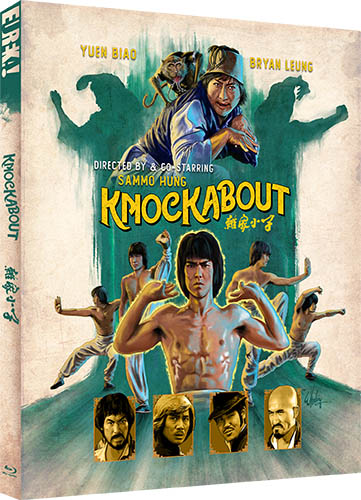
Yipao and Taipao are two brothers who don’t have jobs and survive as con artists, while Fat Beggar is – well – a fat beggar who sometimes gets one up on the brothers. One day the latter are cheated out of their ill-gotten gains by the mysterious Jia Wu Dao. They try to fight him to retrieve their money, but are easily defeated, so they ask him to train them, hoping to become the best fighters in the city. After some persuasion, Jia Wu Dao agrees and soon the brothers are able to beat anyone they come across. However, Jia Wu Dao is not who he seems. Not only is he seemingly using Yipao and Taipao to defeat his enemies for him, but he’s also a killer. Another teacher may be required to train the brothers to a higher standard – which is where Fat Beggar comes in….
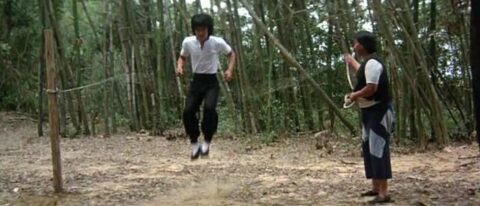
Many Hong Kong movie fans were no doubt excited when Eureka announced that they’ll be releasing some more films featuring Yuen Biao, the man having of course starred in several films alongside his Peking Opera brothers Jackie Chan and Samno Hung as well as playing the leading role in Zu Warriors From The Magic Mountain, all similarly brought out by Eureka. Chan became an international star and Hung built up a strong following too, but Baio never attained their popularity. Why that is can probably be put down to the fact that he didn’t have a strong presence in front of the camera, but for me he managed to make up for this with extraordinary acrobatic abilities that actually put Chan to shame while being no slouch in the martial arts side of things either. I can think of several more Baio titles I’d love Eureka to release, but I don’t want to tempt fate by naming them, so for now we have Knockabout, which was Biao’s first lead role, and Dreadnaught, my review of which will be posted a few days after this one. Knockabout was directed by Hung, who was surely one of the busiest directors and stars in Hong Kong at the time. He originally intended to star as Yipao, but then decided to let Baio play him, forcing much rewriting of the script by Louis Lau and Huang Chik-chin when Hung decided to create the role of Fat Beggar so he could appear alongside his brother. The film doesn’t show much signs of said rewrites, though its plot is thinner than the other Hung films of the period, the first half largely taken up by extended comedic sequences. Some may therefore find the pacing to be rather off, though personally I rather like the way that the fighting side of things is gradually built up and eventually takes over in spectacular fashion with a incredible show stopping climax. I also tend to like the simple, crude Hong Kong movie humour [bar a few dodgy gags in the Lucky Stars films], so I was fine waiting.
Indeed it’s Hung who we see first, a beggar with a monkey on his shoulder, and yes, we do have to immediately adjust to the Hong Kong school of comedy with much mugging, but the series of comedic set pieces which follow, and which were trimmed down a bit for the Export Cut [which also curiously removed a fight, but more on that later] are generally well executed and don’t outstay their welcome. Yipao bumps into a man [“I don’t know you from a hole in the ground” is a great piece of English dubbing] who gives him a letter and package from his uncle containing twenty grams of gold. Yipao goes to change it for money but the pawnbroker [Peter Chan in another film full of familiar Hong Kong movie faces] not only cheats Yipao out of some of the gold but gives him fake coins which are actually rice cakes. No, Yipao isn’t very bright; later on he fails to recognise a WANTED poster for what it is. He goes to share the “money” with his brother Taipao, but cheats him out of some of his share. Taipao catches on, and a jokey fight results in one of the two bags being lost. They then go to a casino with the other bag, but when the staff realise that the money isn’t real, they attack them. They can fight but aren’t really anything special, though of course we know that they will get better in time. Totally down on their luck, they try to scam for a meal, but have no chance getting the better of Jia Wu Dao [given in the English dub the very familiar moniker of Silver Fox]. Realising how skilled he is, they want him to teach them. In fact they want him to teach them so badly that Yipao makes himself into a human bridge so that Jia Wu Dao can step into a boat without getting wet. This seems to do the trick, but there’s something not quite right about Jia Wu Dao. Well, if you’ve seen many films of this ilk, you’ll know that any master who trains our hero and heroes in the first half is likely to actually be bad.
Soon it all goes wrong, though what’s interesting is that Yipao and Taipao, in mistakenly defending Jia Wu Dao, end up killing at least two person they shouldn’t, though this isn’t referred to after. But then again these two are hardly paragons of virtue; they’re devious crooks. Once Jia Wu Dao has taught them some stuff which he calls Useless Boxing [basically playing with a ball] and the Useless Kick [having one of your legs strung up], the two proudly strut around the town looking to practise their new found techniques, which despite their names [which are Womanly Fist and Lady Leg in the Cantonese track] do actually work. Things eventually become much more serious and Jia Wu Dao ends up killing Taipai, which may sound like a spoiler though isn’t really; you know that there needs to be a killing for the “revenge” part of the plot to kick in, and there are very few “good” people in this film. Hung’s role, which initially seems like it’s more of a cameo, comes to the fore and this is where things really shine, in part because of the incredible chemistry that Baio and Hung share. Fat Beggar does things like give him vinegar and chili instead of wine, and water that he hasn’t long washed him feet in, but soon he’s giving out some quite unique training. In a genre where this is often the highlight, here we get to see Baio trying to walk with bamboo shoots strapped to his knees so he can barely walk, Baio trying to practice with wheels under his shoes, and for the piece de resistance, a truly mind boggling display of skill where Baio repeatedly ducks, jumps and back flips so that a rope being swung by Hung doesn’t touch him. And then they swap, and once again you just have to marvel at what a good mover Hung is for such a big man. The two also continue the conning theme, Taipao basically having found a replacement for Tipao in this dog-eat dog-world where to survive you have to cheat.
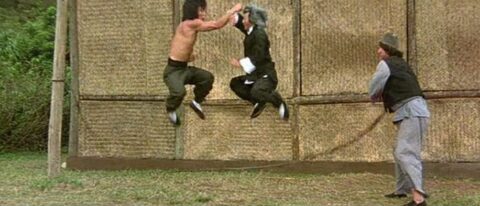
Early brawls tend to be short and comedic, the funniest being when the brothers fight Fatty Beggar but keep on striking each other; the timing is incredible. The exception is the casino fight which gives us our first taste of Baio and Beardy Leung’s abilities along with a rather vicious gag which is repeated with variations. First of all, in a stunning piece of choreography, Taipao keeps hiding under a table but is repeatedly kicked whenever he come out the other side. Then both brothers are thrown to the floor and kicked loads of times. And then Yipao is slapped a few times by his brother. The Export Version totally removes the first time that Taipao and Yipao take out their newly learnt moves on others, a gang of extortionists who smash up a market. This is a great shame, because it has a striking bit from Baio where he stands on one leg while repeatedly kicking with the other. Useless Boxing and the Useless Kick come in handy a few times afterwards, notably when battling two of Jia Wu Dao’s enemies who are perennial villain Lee Hoi San and a very effeminate guy. Stuntman favourite Mars gets to face off against Lau-Kar Wing as Jia Wu Dao, and eventually -oh yes – we get the finale where Biao and Hung battle Lau-Kar Wing, which begins outdoors, moves to a small inn which provides a claustrophobic feel, before moving back outside where the weather is now much nicer than before. It’s the Monkey Style versus the Snake Style [the same year as Snake In The Monkey Shadow but which was first?], but what’s truly cool is the way Biao and Hung fight in unison, one of the best displays of two people working as a team and literally bouncing off each other I’ve ever seen. And there’s still room for laughs without undercutting the excitement, notably when our two heroes both not just act like monkeys but make monkey noises. I’m sure the Monkey Style doesn’t require this, but then again Drunken Boxing doesn’t require getting plastered either. Do our good guys cheat to win? Well, surely if you’re battling a supremely tough and skilled opponent, surely you’d try all means possible to win, and the way they do it is still a continuation of something we saw earlier in training.
There’s hardly any trampoline or wire work in this film, fight choreographer keeping things quite grounded – well, who needs such things when you’ve got Baio around? His acting is very broad [he would get more subtle as the trend moved to modern day pictures] but then so is everybody’s, especially Karl Maka as a cop who’s frequently scratching his head, except for Lau-Kar Wing, quite restrained yet exuding power as Jia Wu Dao even though the colour of his wig seems to go back and forth from white to silver. Hung is way over the top but with his charisma it hardly matters, and the film even gets away with his finishing move being a wrestling technique; well, a body slam from Hung is very likely to do you in, isn’t it? Baio and Leung are also good together and I’d have been content if even more of the running time had been dedicated to their characters trying to survive, constantly scamming – or rather trying to scam – people. We’re hurt when Yipao is slain, and a flashback of Taipao remembering his brother with suitably dramatic music has the right emotional effect. Oh yes, the music. I didn’t recognise much use of western movie soundtracks, but Fat Beggar is often represented by a five-note motif which is cribbed from The Good The Bad And The Ugly, while parts of a suspense cue from My Name Is Nobody. The music directors of these films sure loved Ennio Morricone, but then he was possibly the greatest film music composer of them all, plus one of the most prolific with such a variety of scores to pirate, so that’s entirely understandable.
Though I don’t think it’s widely considered as such, Knockabout for me belongs in the very top section of the many Hong Kong films which attempted to emulate the incredible success of Snake In The Eagle’s Shadow and Drunken Master. It may have a few less surprises than some of the others, director and screenwriters generally content to provide slight variations on familiar scenarios, and a very late plot twist involving Fat Beggar is pointless because it doesn’t really effect the narrative. There’s one gag where somebody is punched on the head repeatedly and huge lumps appear on his head which is really grotesque and therefore maybe a bit out of place. Yet it’s still a great way to introduce Baio as a lead, and a absolutely fantastic showcase for him and Hung. In these days of CGI and flash cuts, one appreciates even more the value, the aesthetic joy of watching such legends do their thing. And the balance between humour and action is actually very well worked out and structured the more I think about it.
SPECIAL FEATURES
Limited Edition O-Card slipcase featuring new artwork by Darren Wheeling [2000 copies]
Reversible sleeve design featuring original poster artwork
Two versions of the film presented in 1080p on Blu-ray from 2K restorations (Original HK Theatrical cut and the shorter Export Cut)
It probably goes without saying that Knockabout looks superb on Blu-ray; both commentaries gush over the picture and so they should. Colours are rich, blacks are deep, grain is of a healthy and even level, and damage is extremely minimal.
Original Cantonese mono audio
I watched Knockabout in its longer, Hong Kong Version with the Classic English dub, so was therefore able to also sample the Cantonese dub when we come to the scenes that were cut for the Export Version which weren’t dubbed into English. Three scenes were cut; the afore mentioned market fight, the second half of an extended comic sequence involving the fake money, and a brief bit of Yipao showing Fat Beggar something he can’t do.
Optional English dubbed audio:
Classic Dub
This dub has all the flavour and entertainment value you could want. Sure, some of the voices are very goofy, but so is some of the film.
Newer Dub
Eureka actually provide two English dubs, though this more recent one is very bland by comparison, with nearly everyone speaking in the same American accent and fashion. The only advantage is that it was created for a release of the longer cut, so we don’t get any sudden changes into Cantonese.
Optional English Subtitles, newly translated for this release
Brand new feature length audio commentary by Asian film experts Frank Djeng [NY Asian Film Festival] and Michael Worth
Though listings of the special features say that Djeng does this track solo, he’s actually joined by Worth who did the same on some of the commentaries in Eureka’s Cinematic Vengeance! 8 Kung Fu Classics From Director Joseph Kuo, this probably being a late decision. We get the usual track packed with appreciation and information, Djeng again being especially useful in pointing out things that westerners wouldn’t get, such as references to Deep Throat[!] and a cartoon weatherman on Chinese TV, and even notices that Baio is dubbed by a different person in one scene, while Worth is more interested in the filming style. We also learn things such as it being Ng See Yuen who chose the guy who dubbed Jackie Chan for thirteen years.
Brand new feature length audio commentary by action cinema experts Mike Leeder & Arne Venema
A particularly boisterous Leeder, who tells us that he used to date the niece of Billy and Peter Chan joins Venema again for another hugely fun track which, as always, is a nice contrast to the other. This one is even looser than usual – however did they get on to revealing that they both used to go to raves in Hong Kong? – but as usual we learnt a lot of interesting stuff, such as the state of gambling in Hong Kong, which is illegal until your boat is just the right distance from the harbour. The odd tidbit is repeated, such as Hung, Baio and company not being allowed to pee in the mornings when they were kids training for Peking Opera, but then we also learn that Hung’s new, more truthful, film about their experiences is definitely getting off the ground, which is exciting.
Heavy Hitter: Archival interview with Sammo Hung [7 mins]
The first of the old Hong Kong Legends extras has Hung tell of how Baio is shy and how he had to teach him kung fu, plus a little bit about the other cast and rewriting the script to put Baio in it. As usual, Hung seems slightly ill at ease being interviewed.
Above The Law: Archival interview with Bryan “Beardy” Leung Kar-yan [7 mins]
Leung says how he appeared in his first Chang Cheh movie two days after auditioning even though he didn’t know kung fu except for what he’d seen in movies, how incredibly hard the process of making films like Knockabout was, and how Hung would ask his co-stars to kick him, otherwise he’d kick them. Leung seems a lot more relaxed and open talking about this kind of thing than Hung.
Monkey Magic: Archival interview with Grandmaster Chan Sau Chang (aka The Monkey King), a master of Monkey Style kung fu [25 mins]
This is a great primer in the style, discussing in depth how it copies the movement and mannerisms of monkeys, plus the various kinds; for example we have Lost Monkey which is based on agility and smartness. Chan Sau Chang also tells of how being bullied as a kid made him take up kung fu, his skill eventually meaning that, when he was hit by a truck, he moved away so swiftly that he wasn’t hurt – though the driver soon was! Enhanced by actual displays of the Monkey Style, this is a fascinating extra that’s easy to understand even if you’re not that into the martial arts.
Deleted Scene Used as a Teaser for the Japanese Release [3 mins]
This rather unique addition, no doubt another late one as its’s not listed, is much like your typical old style kung fu movie introduction, with Baio performing move in front of a red background, only that Hung comes on half way through to add some humour.
Hong Kong Theatrical Trailer [4 mins]
A Limited Edition collector’s booklet featuring new writing by James Oliver [2000 copies]
Eureka deliver another knockout of a kung fu movie and another knockout of a release. Highly Recommended.






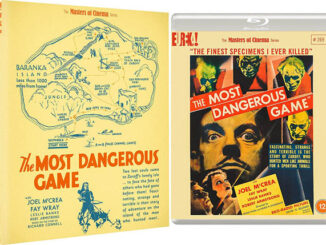
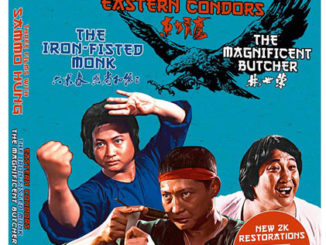
Be the first to comment